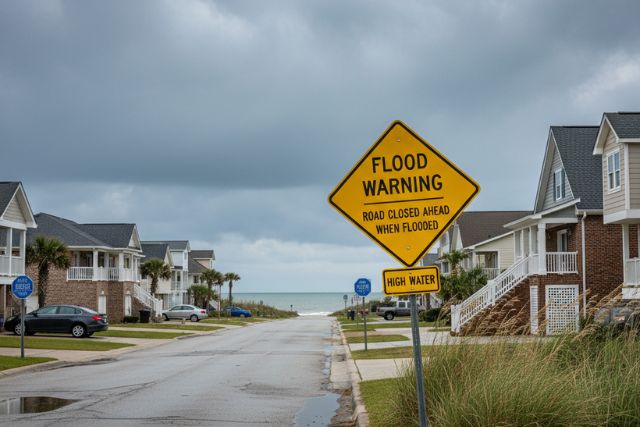Key Takeaways
Virginia’s rental laws have evolved in 2025. Landlords must stay updated with changes to the Virginia Residential Landlord and Tenant Act (VRLTA) and new disclosure requirements.
Coastal markets present unique challenges, including flood zone management, insurance coverage, and short-term rental regulations.
Proper tenant screening and lease documentation are essential for avoiding costly legal disputes and ensuring Fair Housing compliance.
Preventive maintenance and storm preparation protect property value and reduce long-term costs.
Partnering with a local expert like Abrams Rent simplifies compliance, rent collection, and tenant management across Coastal Virginia.
Managing rental properties in Coastal Virginia demands more than collecting rent. Landlords in 2025 face updated legal requirements, evolving tenant expectations, and new environmental challenges, especially in flood-prone areas. From understanding the Virginia Residential Landlord and Tenant Act (VRLTA) to preparing for local short-term rental laws and seasonal maintenance, landlords must stay informed and proactive. This guide from Abrams Rent, a leading Virginia Beach property management firm, breaks down essential laws, market trends, and best practices to help property owners succeed in today’s competitive rental landscape.
What's Your Rental Worth?
Book a Free Rental Analysis Now!
Understanding the Legal Landscape for Virginia Landlords

Virginia Residential Landlord and Tenant Act (VRLTA) Overview
Every Virginia landlord must comply with the Virginia Residential Landlord and Tenant Act (VRLTA), which governs rental relationships across the Commonwealth. It covers everything from security deposits to eviction procedures and maintenance standards. Read the full statute on the Code of Virginia’s official website.
Security Deposit Rules
Virginia law caps security deposits at no more than two months’ rent. Landlords must return the balance within 45 days after tenants move out and provide a written itemized list of deductions. Documentation such as move-in checklists and photo records are essential for compliance.
For more information, refer to §55.1-1226 of the Virginia Code.
Required Disclosures
Landlords must disclose any known mold, provide a lead-based paint disclosure for properties built before 1978, and identify who manages or owns the property. The Environmental Protection Agency (EPA) provides official disclosure guidelines.
Habitability Standards
Under the VRLTA, landlords must maintain habitable conditions, including safe electrical, plumbing, and heating systems. This means functioning smoke and carbon monoxide alarms, secure locks, and adherence to local building codes.
Handling Evictions and Notices the Right Way
When Eviction Is Permitted
In Virginia, evictions (unlawful detainers) are allowed for nonpayment of rent, substantial lease violations, or holdover tenancies. Before filing, landlords must issue proper written notice.
For example, a “5-Day Pay or Quit Notice” is required before beginning court proceedings for unpaid rent.
Eviction Timeline and Documentation
A compliant process includes:
Serving written notice
Documenting communication and rent ledgers
Filing an unlawful detainer with the Virginia General District Court
Scheduling hearings and coordinating with the sheriff if necessary
Landlords should consult the Virginia Court System’s Landlord Resources (vacourts.gov) to verify forms and procedures.
Have a Question?
Ask a Property Manager!
Reducing Eviction Risk
Communication is key. Offer payment plans or mediation before eviction. At Abrams Rent, we prioritize early tenant outreach, payment coordination, and legal compliance, saving landlords time, money, and stress.
Local Rules and Special Considerations

Short-Term vs. Long-Term Rentals
Virginia Beach, Norfolk, and Chesapeake regulate short-term rentals (STRs) differently than long-term leases.
Virginia Beach requires registration and transient occupancy tax collection.
Norfolk mandates zoning compliance and specific parking rules.
Chesapeake restricts STRs in certain neighborhoods.
You can find official guidance from the City of Virginia Beach here: Short-Term Rental Permits & Requirements.
Rental Registration & Inspections
Several Hampton Roads cities such as Norfolk and Portsmouth require rental property registration or periodic safety inspections. Check your local city government website to confirm if your property is in an inspection district.
Weather and Flood Planning
Coastal landlords face unique environmental risks. Salt air causes corrosion, and rising humidity raises mold potential. Use the FEMA Flood Map Service Center to check your property’s zone.
Tip: Add a “Storm Preparedness Addendum” to leases, clarifying responsibilities for securing property before hurricanes.
Screening and Fair Housing Compliance
Fair Housing Laws
The Fair Housing Act and Virginia Fair Housing Law prohibit discrimination based on race, color, religion, national origin, sex, familial status, disability, or source of income. Learn more at the HUD Fair Housing Overview.
Effective Tenant Screening
Follow consistent criteria:
Minimum credit score
Income verification (usually 3x rent)
Prior landlord references
Criminal background checks (within allowed limits)
Keep consistent documentation for every applicant. Abrams Rent uses transparent screening protocols to help landlords stay compliant.
Handling Accommodation Requests
When tenants request reasonable accommodations (like service animals), respond promptly and document all interactions. Follow HUD’s official Assistance Animal Guidance for compliance.
Drafting Leases and Addenda

Essential Clauses
A Virginia lease should include:
Rent amount and due date
Security deposit amount
Maintenance responsibilities
Entry rights (minimum 72 hours’ notice)
Late fees, if applicable (must be stated in lease)
Recent updates in 2025 (House Bill 2430) require that security deposit, rent, and all fees appear clearly on the first page.
Optional Addenda
Add flood zone, hurricane, pet, mold, or HOA addenda to ensure clarity. The Virginia Department of Housing and Community Development (DHCD) offers guidance on standard lease elements: DHCD Landlord-Tenant Resources.
Digital Tools
Use digital signatures and online storage for better security and recordkeeping. Abrams Rent provides online lease management, rent collection, and owner access portals, making compliance effortless.
Maintenance, Inspections, and Property Care
Preventive Maintenance Plan
For coastal Virginia, focus on:
HVAC service every 6 months
Roof and gutter checks before hurricane season
Dehumidifier and mold inspections
Salt corrosion prevention on metal fixtures
Move-In / Move-Out Inspections
Document everything. Use photo checklists, dated signatures, and itemized records. Keep copies of condition reports for at least five years in case of disputes.
Managing Finances, Taxes, and Insurance

Rent Collection and Late Fees
Online rent collection ensures clear digital trails. Late fees must comply with your lease and VRLTA requirements. Always disclose them upfront.
Insurance Coverage
A standard landlord policy covers property and liability, but flood insurance (via FEMA’s National Flood Insurance Program) is strongly advised for coastal landlords: NFIP Flood Insurance.
Taxes and Recordkeeping
Keep detailed expense records for deductions (repairs, depreciation, mortgage interest). For short-term rentals, remember to remit Transient Occupancy Tax (TOT) per city guidelines.
Understanding 2025 Rental Market Trends in Coastal Virginia
Market Overview
The Hampton Roads area remains one of Virginia’s most active rental markets, driven by:
Military relocation demand
Strong port and shipyard employment
Continued urban redevelopment in Norfolk and Virginia Beach
Average 2025 rents in Virginia Beach hover around $1,800 for single-family homes, a 4% increase year-over-year (Hampton Roads REALTORS® Association).
Value-Add Upgrades
Simple improvements such as moisture-resistant flooring, smart thermostats, and corrosion-resistant fixtures yield high ROI in coastal climates.
When to Raise Rent
Virginia law doesn’t cap rent increases but requires proper notice typically 30 days before renewal. Abrams Rent’s owner dashboards make it easy to forecast rent adjustments based on current comps.
Why Partner with Abrams Rent for Property Management
(Photo suggestion: Abrams Rent property management team in office — Alt text: “Abrams Rent property managers helping Virginia landlords, 2025.”)
Full-Service Support
From marketing to maintenance, Abrams Rent handles it all with a flat monthly fee — no hidden or “junk” fees. Learn more at Abramshomes.com.
Owner Transparency
Landlords get 24/7 access to online statements, inspection reports, and payment logs. Tenants enjoy responsive service and a modern, digital experience.
Local Expertise
Our Virginia Beach-based team knows the coastal market better than anyone — helping you navigate local inspections, flood zones, and rental pricing.
2025 Coastal Virginia Landlord Checklist
Update your leases with 2025 VRLTA changes
Confirm all required disclosures are complete
Inspect and document property condition
Register your rental if required by your city
Verify flood zone and insurance coverage
Implement an online rent collection system
Standardize tenant screening procedures
Schedule seasonal maintenance checks
Prepare emergency and storm policies
Contact Abrams Rent for professional property management
Bottomline
Managing rentals in Coastal Virginia requires balancing compliance, maintenance, and tenant satisfaction, all while adapting to evolving 2025 regulations and market trends. By staying informed and leveraging professional support, landlords can protect their investments and maximize returns. Whether you own one property or a growing portfolio, working with experts like Abrams Rent ensures peace of mind, consistent income, and full legal compliance.
For personalized guidance and full-service property management across Hampton Roads, visit AbramsRent.com or call 757.644.3800 to learn how Abrams Rent can simplify your rental success.

 (1).jpg)
